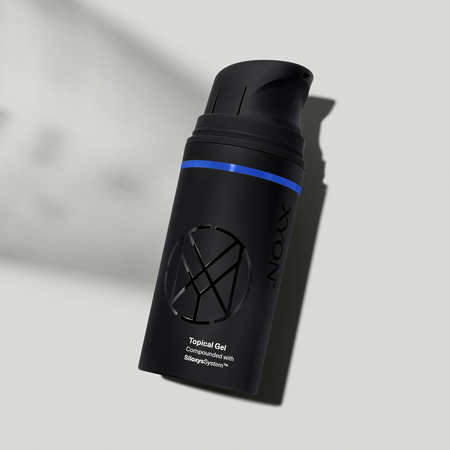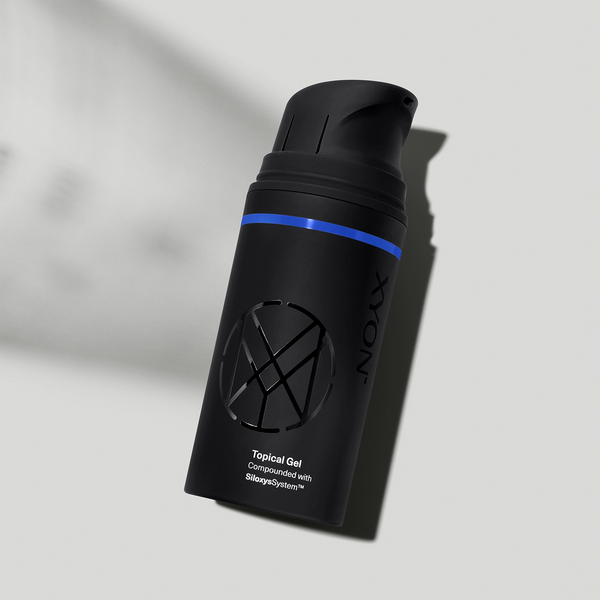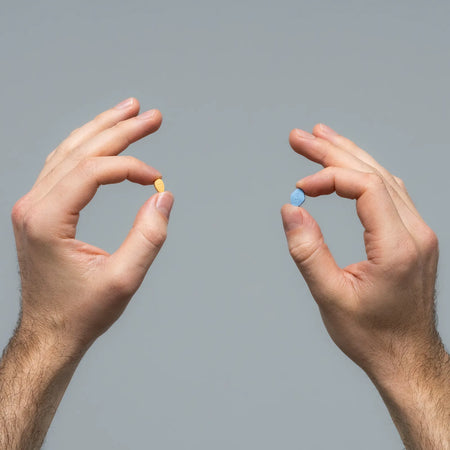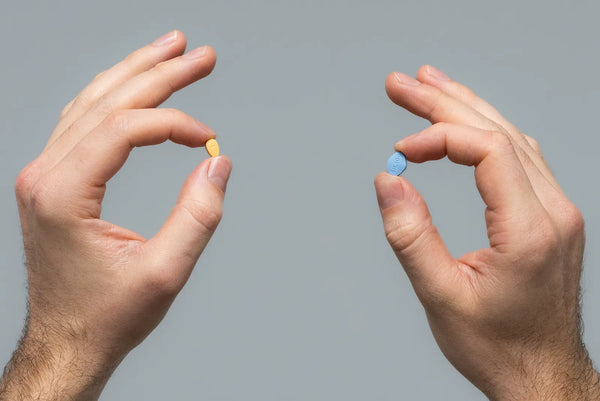Avoiding erectile dysfunction while taking dutasteride is not impossible and the risks can be diminished by taking proactive steps. Finasteride was the first medication approved by the FDA to treat male pattern hair loss and now dutasteride, a drug belonging to the same family as finasteride, is increasingly being prescribed off-label as an alternative. If you’re considering talking to your doctor about whether dutasteride is right for you or are already on finasteride and want to make the switch and avoid possible side effects, you’re in the right place. Let’s take a closer look at whether dutasteride causes erectile dysfunction and if permanent sexual side effects are also an issue with this medication.
How does dutasteride work?
Like finasteride, dutasteride is a 5-alpha reductase inhibitor. It blocks an enzyme called 5-alpha reductase and prevents it from converting testosterone into dihydrotestosterone (DHT). DHT is necessary for the maintenance of normal male health, but in some men with a genetic predisposition for pattern hair loss, DHT can cause hair follicles to shrink over time. Hair follicles that undergo this process (also called follicular miniaturization) are unable to produce viable hairs, leading to the classic signs of thinning and areas of balding associated with this hair loss disorder.


Topical Dutasteride with SiloxysSystem™ Gel treats hair loss with fewer side effects.
Combat the effects of DHT on hair follicles with a state-of-the-art formula.
In terms of differences, finasteride blocks one form of the 5-alpha reductase enzyme while dutasteride blocks two forms. This is one of the reasons why in clinical trials, oral dutasteride was found to lower blood levels of DHT by up to 90% compared to oral finasteride which lowers DHT levels by approximately 70% (Zito et al., 2024). Oral finasteride is clinically effective at delaying the progression of thinning and promoting hair regrowth, but some patients (particularly those who have already tried finasteride and didn’t experience results) may benefit from the more potent DHT-blocking effects of dutasteride. Neither oral nor topical dutasteride are currently approved by the FDA or Health Canada for the treatment of androgenetic alopecia. If you’re interested in trying dutasteride, be aware that you’ll need to consult with a doctor who can assess whether dutasteride would be a safe and effective option for you.
Does dutasteride cause erectile dysfunction?
Potentially. Erectile dysfunction is a known side effect of dutasteride. Although dutasteride is a newer medication, there is some clinical data available on how its safety profile compares to finasteride’s. Generally speaking, sexual side effects that have been associated with finasteride also apply in the case of dutasteride.
The exact causes of erectile dysfunction in patients taking 5-alpha reductase inhibitors aren’t well defined but it may have something to do with the role of DHT in the maintenance of healthy penile tissues, blood vessel function in this part of the body and its indirect effects on parts of the brain involved in the sexual response (Corona et al, 2017).
In a study of males taking oral dutasteride for the treatment of an enlarged prostate (BPH), 7.3% of participants reported erectile dysfunction, 4.2% reported decreased libido and 2.2% reported changes relating to ejaculation (Roehrborn et al., 2002). For comparison, a 2016 systematic review reported percentage ranges of 3.4-15.8% for erectile dysfunction, 2.36-10% for decreased libido and 0.9-5.7% for ejaculatory changes for oral finasteride (Hirshburg et al., 2016). There aren't many head-to-head studies of side effects reported by dutasteride versus finasteride users, but at least one systematic review and meta-analysis has revealed similar rates of sexual dysfunction between the two medications (Zhou et al., 2019).
Can dutasteride lower libido?
As with erectile dysfunction and other sexual side effects, dutasteride may cause changes in libido. The exact mechanisms are being studied, but it may have something to do with the effect of dutasteride on levels of steroid hormones involved in brain pathways that control sexual desire and pleasure. These changes are usually temporary. If you notice changes in sex drive while taking dutasteride, it’s important to talk to a healthcare professional to assess whether medication is the root cause.
Is erectile dysfunction after taking dutasteride permanent?
Generally, no, but we acknowledge that there have been reports of permanent or long-term side effects in the past several years related to the use of 5-alpha reductase inhibitors such as dutasteride. It’s called post-finasteride syndrome, and although it’s not clear whether finasteride or dutasteride directly cause these long-term effects, they can have a significant impact on quality of life for patients. We encourage all patients who think they may be experiencing side effects to communicate these to their prescribing doctors.
Like finasteride, continued use of dutasteride seems to help with side effects, with patients reporting fewer incidences of sexual side effects in their second year of treatment (Wu et al., 2014). This is supported by an earlier four-year trial of dutasteride in patients with BPH which found that side effect rates decreased from 6% in the first year to 0.4% in the fourth year of treatment (Debruyne et al., 2004). However, there is some conflicting research that suggests that there may be a potential link between erectile dysfunction and duration of treatment with dutasteride (Kiguradze et al., 2017). Assuming treatment duration plays a role, it’s still not clear what the optimal exposure time to dutasteride is to minimize the risk of sexual side effects.
With any medication, the likelihood of experiencing side effects can vary from person-to-person and most of the studies done on the safety and efficacy of 5-alpha reductase inhibitors haven’t been set up to examine the long-term sexual adverse effects of treatment with dutasteride. What we do know is that in the short term, sexual side effects are generally mild to moderate in nature and tend to be reversible.
Can I use sildenafil (generic Viagra) or tadalafil (generic Cialis) while taking dutasteride?
Yes, you can take either sildenafil or tadalafil (or the branded versions of these medications) while taking dutasteride. If you’re taking any other prescription medications or supplements, it’s important to share this information with your doctor because some classes of drugs such as nitrates can have potentially dangerous interactions with erectile dysfunction medications.


Generic Viagra (Sildenafil) or Generic Cialis (Tadalafil) Now Available From XYON
Get the more affordable and equally effective options for treating erectile dysfunction. Complete your online consultation in minutes.
Can dutasteride or tadalafil affect testicular health?
Dutasteride may affect testicular health, although the duration of these effects is not well known. Tadalafil has not been found to have significant effects on testicular health.
In the short term, dutasteride can cause side effects such as testicular pain, tenderness or swelling which are less commonly reported compared to other sexual side effects such as erectile dysfunction or lowered libido. Less is known about the long-term effects of dutasteride use on male fertility. One multicenter, randomized, double-blinded, placebo-controlled trial found that men who took 0.5 mg dutasteride for a year experienced a statistically significant decrease in total sperm count of 28.6% after 26 weeks, but showed gradual recovery at 52 weeks and 24 weeks post-study. Decreases in semen volume and sperm count were also noted, though these also showed signs of recovery by the end of the 24-week follow-up period (Amory et al., 2007).
Tadalafil doesn't appear to have a negative impact on testicular health. A study done in 2003 concluded that 10 mg and 20 mg doses of tadalafil taken over a 6-month period had no detrimental effects on sperm production or levels of reproductive hormones in men aged 45 or older (Hellstrom et al., 2008).
How can I minimize the risk of erectile dysfunction while on dutasteride?
Remember, no prescription medication is without its risks. Dutasteride can cause erectile dysfunction and although it’s rare, could result in long-term side effects in the same way as finasteride. However, there are steps that you can take to minimize your risk.
Talking to a doctor is the first step. The risk of experiencing side effects is theoretically higher with oral medications because the entire body is exposed to the drug. Studies on topical vs oral finasteride have shown that topical formulations can result in lower systemic absorption and potentially, a lower risk of systemic side effects (Piraccini et al., 2021). Because topical dutasteride is a newer concept, more research is likely needed before we’re able to compare levels of topical exposure to oral dutasteride.
Your doctor could also recommend an alternate day dosing schedule, which involves taking or using dutasteride less frequently to reduce exposure without compromising on efficacy. Whatever the solution, it’s important that you take your prescription as directed and don’t try to make any changes without first consulting with a healthcare professional.
At XYON, we make it easy to connect with a hair expert who can address questions and concerns about dutasteride and possible side effects such as erectile dysfunction. Start a consultation today to get started on your journey to better hair.
Citations:
Amory, J. K., Wang, C., Swerdloff, R. S., Anawalt, B. D., Matsumoto, A. M., Bremner, W. J., Walker, S. E., Haberer, L. J., & Clark, R. V. (2007). The effect of 5alpha-reductase inhibition with dutasteride and finasteride on semen parameters and serum hormones in healthy men. The Journal of Clinical Endocrinology and Metabolism, 92(5), 1659–1665. https://doi.org/10.1210/jc.2006-2203
Corona, G., Tirabassi, G., Santi, D., Maseroli, E., Gacci, M., Dicuio, M., Sforza, A., Mannucci, E., & Maggi, M. (2017). Sexual dysfunction in subjects treated with inhibitors of 5α-reductase for benign prostatic hyperplasia: a comprehensive review and meta-analysis. Andrology, 5(4), 671–678. https://doi.org/10.1111/andr.12353
Debruyne, F., Barkin, J., van Erps, P., Reis, M., Tammela, T. L., Roehrborn, C., & ARIA3001, ARIA3002 and ARIB3003 Study Investigators (2004). Efficacy and safety of long-term treatment with the dual 5 alpha-reductase inhibitor dutasteride in men with symptomatic benign prostatic hyperplasia. European Urology, 46(4), 488–495. https://doi.org/10.1016/j.eururo.2004.05.008
Hellstrom, W. J., Gittelman, M., Jarow, J., Steidle, C., McMurray, J., Talley, D., Watts, S., Mitchell, C. L., & McGill, J. M. (2008). An evaluation of semen characteristics in men 45 years of age or older after daily dosing with tadalafil 20mg: results of a multicenter, randomized, double-blind, placebo-controlled, 9-month study. European Urology, 53(5), 1058–1065. https://doi.org/10.1016/j.eururo.2007.09.046
Hirshburg, J. M., Kelsey, P. A., Therrien, C. A., Gavino, A. C., & Reichenberg, J. S. (2016). Adverse Effects and Safety of 5-alpha Reductase Inhibitors (Finasteride, Dutasteride): A Systematic Review. The Journal of Clinical and Aesthetic Dermatology, 9(7), 56–62.
Kiguradze, T., Temps, W. H., Yarnold, P. R., Cashy, J., Brannigan, R. E., Nardone, B., Micali, G., West, D. P., & Belknap, S. M. (2017). Persistent erectile dysfunction in men exposed to the 5α-reductase inhibitors, finasteride, or dutasteride. PeerJ, 5, e3020. https://doi.org/10.7717/peerj.3020
Piraccini, B. M., Blume-Peytavi, U., Scarci, F., Jansat, J. M., Falqués, M., Otero, R., Tamarit, M. L., Galván, J., Tebbs, V., Massana, E., & Topical Finasteride Study Group (2022). Efficacy and safety of topical finasteride spray solution for male androgenetic alopecia: a phase III, randomized, controlled clinical trial. Journal of the European Academy of Dermatology and Venereology: JEADV, 36(2), 286–294. https://doi.org/10.1111/jdv.17738
Roehrborn, C. G., Boyle, P., Nickel, J. C., Hoefner, K., Andriole, G., & ARIA3001 ARIA3002 and ARIA3003 Study Investigators (2002). Efficacy and safety of a dual inhibitor of 5-alpha-reductase types 1 and 2 (dutasteride) in men with benign prostatic hyperplasia. Urology, 60(3), 434–441. https://doi.org/10.1016/s0090-4295(02)01905-2
Wu, X.-J., Zhi, Y., Zheng, J., He, P., Zhou, X., Li, W., & Zhou, Z. (2014). Dutasteride on benign prostatic hyperplasia: A meta-analysis on randomized clinical trials in 6460 patients. Urology, 83(3), 539–543. https://doi.org/10.1016/j.urology.2013.10.007
Zhou, Z., Cui, Y., Wu, J., & Jin, H. (2020). Efficacy and safety of dutasteride compared with finasteride in treating males with benign prostatic hyperplasia: A meta-analysis of randomized controlled trials. Experimental and Therapeutic Medicine, 20(2), 1566–1574. https://doi.org/10.3892/etm.2020.8851
Zito PM, Bistas KG, Patel P, et al. Finasteride. [Updated 2024 Feb 28]. In: StatPearls [Internet]. Treasure Island (FL): StatPearls Publishing; 2025 Jan-. Available from: https://www.ncbi.nlm.nih.gov/books/NBK513329/




